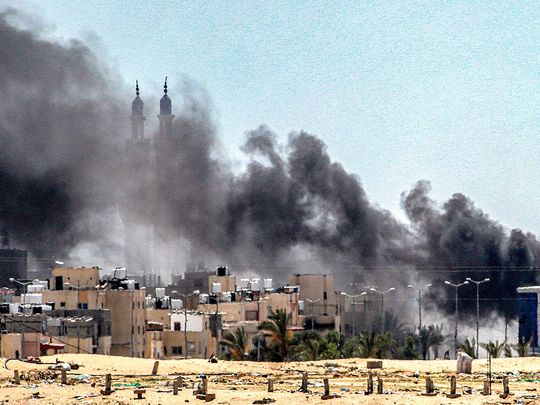
A new book by French political scientist and Arabist Gilles Kepel, titled “Genocide: Israel, Gaza, and the War against the West” was released in Arabic last month by the Arab Organisation for Translation.
Kepel offers his perspective on the situation in Gaza, explaining that while his work cost him his position at the university, the book is not for those seeking simple “black and white” narratives. Instead, it offers a nuanced examination of the conflict, exploring the complexities within a broad grey area.
The book methodically deconstructs and reconstructs the crisis, connecting outcomes to their causes and prioritising a knowledge-based approach over ideological interpretations.
Rich with both well-known information and new findings from meticulous research and investigation, Kepel’s work challenges readers to think critically about the deep-seated issues at play.
He contextualises what happened on Oct. 7 within a broader framework that reflects the shifting global dynamics at a time when world powers are realigning. This framework includes the traditional northern countries (the West) and the southern bloc, including China and Russia, along with emerging middle powers.
There has been a decisive shift in the global balance of power, both demographically and economically, with Israel aligning itself with the northern countries and Palestine with the southern bloc.
The initial attacks on Oct. 7, 2023, were broadcast live both visually and audibly, with some attackers streaming the events directly to the world. This moment deeply affected Israeli society, bringing back memories of past horrors. It also impacted Western societies, especially France, reminding them of previous militant attacks.
Initially, there was significant sympathy for the victims. However, this changed as the extent of Israel’s forceful retaliation against civilians by sea, air, and land became clear, showing more victims and more severe violence. This escalation led to a shift in public sympathy towards the oppressed, whose suffering continues to mark the history of this conflict.
The author revisits Oct. 7, following the 2001 invasion of Manhattan, the same day Osama bin Laden declared, “I have a few words for America and its people: I swear by God Almighty, who has raised the sky without pillars, America and anyone who lives there will never dream of security unless we have it in reality in Palestine.”
The book examines the long-standing conflict in Palestine, where both Israelis and Palestinians have deeply held beliefs tied to divine rights and victories, mixing theology with politics.
The book contrasts Israel’s past short-lived wars with the current prolonged conflict. The current war is nearing ten months without a clear victory for either Israel or Hamas. The author points to a significant internal conflict in Israel, predicting lasting impacts long after the fighting stops.
Kepel delves into the organisational structure of Hamas, describing it as divided into two main branches. The first is the political leadership, which seeks to maintain contact with America in exchange for financial support from various countries.
This branch is noted for its financial dealings, which the book specifies in detail. The second branch is the internal leadership, which resembles the Iranian Revolutionary Guards.
An opportunistic justification
The book references an interview from 2017 with Al Mayadeen TV, known for its Iranian leanings, in which Yahya Sinwar discussed the extensive support Hamas received from Qassem Soleimani, the commander of the Quds Force. It also mentions Fathi Shaqaqi, the founder of Islamic Jihad, who wrote “Khomeini: The Islamic Alternative”. Shaqaqi was assassinated in Malta in 1995.
Discussing the complex relationships involving Iran, the Revolutionary Guards, Hamas’ militant wing, and Islamic Jihad, “Genocide: Israel, Gaza, and the War against the West” highlights an integrated connection that extends to Hezbollah in Lebanon. Despite Hezbollah’s denials regarding the events of Oct. 7, the author criticises this stance as merely opportunistic justification.
The narrative highlights Israel’s weaknesses, showing how the extended conflict exposed its inability to effectively protect its citizens. Despite having prior intelligence about potential threats, Israeli authorities, driven by hardliner agendas, focused on expanding and securing settlements in the West Bank rather than addressing these security warnings seriously.
This approach exploited the internal Palestinian divide between Hamas and the Palestinian Authority and relied on covert agreements with the political arm of Hamas.
The narrative suggests that both Iranian and American powers are more interested in managing the conflict rather than resolving it. Iran aims to maintain its influence over its followers for future strategic purposes, while America struggles to exert meaningful influence over its ally.
Kepel’s work has myriad insights and analysis, making it an essential read for those interested in the subject.
Mohammad Alrumaihi is an author and Professor of Political Sociology at Kuwait University








_resources1_16a45059ca3_small.jpg)

